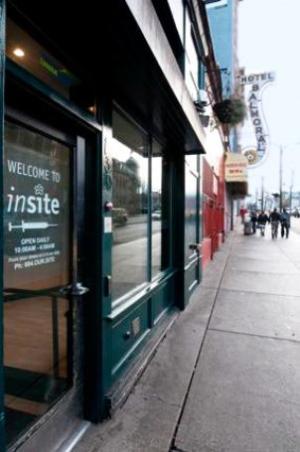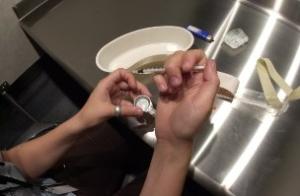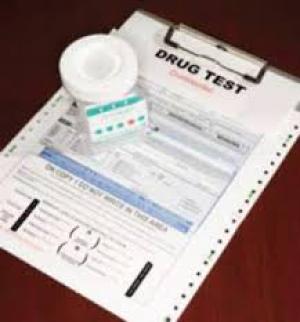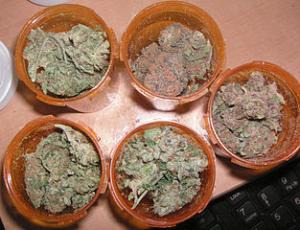A broad-based heroin and opioids task force has recommended them. The mayor, the county executive, and the county sheriff are on board. But what about the feds?
The governors of Delaware and New Jersey sign medical marijuana expansion bills, casino magnate Sheldon Adelson kicks in a million bucks to fend off medical marijuana in Florida, Montana patients are losing access to providers, and more.
The FBI is investigating a pair of Louisville narcs, the state police are investigating thefts at a Massachusetts police department, a Philly cop gets busted sending pot through the mail, and more.
Defense Secretary Ash Carter seems pretty mellow about marijuana, more workers are testing positive for illegal drugs, medical marijuana advances in Massachusetts, Michigan, and New Jersey, and more.
Oregonians have no regrets about legalizing weed, a new Cato report studies the impact of state-level legalization so far, the Alaska battle over marijuana social clubs gets heated, and more.
Donations are starting to flow for and against reform initiatives, California's largest newspaper endorses pot legalization, so do Italian cops, a new study suggest medical marijuana may reduce opioid-related auto fatalities, it's time to act to keep kratom off Schedule I, and more.
A Seattle/King County heroin task force has recommended two safe injection sites be established, a California bill to let landlords ban medical marijuana smoking dies, Nevada legalization foes get organized, and more.
It's all marijuana news today, and there's not even much of that. Nashville semi-decriminalizes small-time possession, a study finds New Mexico could make big bucks off legalization, and more.
Seattle and surrounding King County are on a path to establish the country's first supervised drug consumption sites as part of a broader campaign to address heroin and prescription opioid misuse. A 99-page report released last week by the Heroin and Prescription Opiate Addiction Task Force calls for setting up at least two of the sites, one in the city and one in the suburbs, as part of a pilot project.
The facilities, modeled on the Canadian government-funded
InSite supervised injection site in Vancouver, just 140 miles to the north, would be places where users could legally inject their drugs while under medical supervision and be put in contact with treatment and other social services. There have been no fatal overdoses in the 13-year history of
InSite.
Although such facilities, which also operate in various European countries and Australia, have been proven to reduce overdose deaths and drug use-related disease, improve local quality of life, and improve the lives of drug users, they remain controversial, with foes accusing them of "enabling" drug use. Thus, the report refers to them not as "safe injection sites," or even "supervised consumption sites," but as the anodyne "Community Health Engagement Locations" (CHELs).
"If it's a strategy that saves lives then regardless of the political discomfort, I think it is something we have to move forward," said County Executive Dow Constantine, discussing the plan at a news conference last week.
The safe sites will address the region's high levels of opioid and heroin use, or what the task force called "the region's growing and increasingly lethal heroin and opioid epidemic." As the task force noted, the number of fatal overdoses in the county has tripled in recent years, with the rate of death rising from roughly one a week (49) in 2009 to one very other day (156) in 2014. The current wave of opioid use appears centered on young people, with the number of people under 30 seeking treatment doubling between 2006 and 2014, and now, more young people are entering detox for heroin than for alcohol.

Outside Vancouver's InSite (vch.ca)
Overdose deaths actually dropped last year to 132, thanks to Good Samaritan laws that shield people who aid overdose victims from prosecution and to the wider use of the
opioid overdose reversal drug
naloxone. But that's still 132 King County residents who needn't have died. Task force members said the
CHELs would help reduce that number even further.
"The heroin epidemic has had a profound effect not just on our region, but across our country as a whole," said Seattle Mayor Ed Murray. "It is critical that we not only move forward with meaningful solutions that support prevention and treatment, but that we remove the stigma surrounding addiction that often creates barriers to those seeking help.
Not only are key local elected officials on board, so is King County Sheriff John Urquhart. He said the safe site plan was workable.
"As long as there was strong, very strong, emphasis on education, services, and recovery, I would say that yes, the benefits outweigh the drawbacks," he said. "We will never make any headway in the war on drugs until we turn the war into a health issue."
The region may willing to embrace this ground-breaking harm reduction measure, but it is going to require some sort of federal dispensation to get around the Controlled Substances Act and the DEA. How that is going to happen remains to be seen, but Seattle is ready.
The task force wasn't just about CHELs. In fact, the safe sites are just a small, if key, component of a broad-based, far-ranging strategy to attack the problem. The task force report's recommendations come in three categories:

Inside Vancouver's InSite (vch.ca)
- Increase public awareness of effects of opioid use, including overdose and opioid-use disorder.
- Promote safe storage and disposal of medications.
- Work with schools and health-care providers to improve the screening practices and better identify opioid use.
Treatment Expansion and Enhancement
- Make buprenorphine more accessible for people who have opiate-use disorders.
- Develop treatment on demand for all types of substance-use disorders.Increase treatment capacity so that it’s accessible when and where someone is ready to receive help.
Health and Harm Reduction
- Continue to distribute more naloxone kits and making training available to homeless service providers, emergency responders and law enforcement officers.
- Create a three-year pilot project that will include at least two locations where adults with substance-use disorders will have access to on-site services while safely consuming opioids or other substances under the supervision of trained healthcare providers.
Will Seattle and King County be able to actual implement the CHELs? Will the federal government act as obstacle or facilitator? That remains to be seen, but harm reductionists, policymakers, and drug users in cities such as Portland, San Francisco, and New York will be watching closely. There have been murmurs about getting such sites up and running there, too.
back to top
The governors of Delaware and New Jersey sign medical marijuana expansion bills, casino magnate Sheldon Adelson kicks in a million bucks to fend off medical marijuana in Florida, Montana patients are losing access to providers, and more.
NationalOn Monday, a study of fatal car crashes found medical marijuana may curb opioid use. A study conducted at Columbia University's Mailman School of Public Health has found that fewer drivers killed in car crashes tested positive for opioids in medical marijuana states than before those laws went into effect. The findings will be published online in the American Journal of Public Health.
California
On Tuesday, a bill to let landlords ban smoking medical marijuana died. Assemblyman Jim Wood (D-North Coast) has dropped his bill that would let landlords ban smoking medical marijuana after he conceded he was unable to figure out how to meet the needs of medical marijuana patients.
Delaware
Last Thursday, the governor signed a bill allowing medical marijuana use at school. Gov. Jack Markell (D) has signed into law Senate Bill 181 , which allows registered medical marijuana patients to use their medicine while on school grounds. The law allows for cannabis-based medicines such as tinctures and oils to be used. Delaware is now the third state to enact such a law, following Colorado and New Jersey. The new law takes effect immediately.
Florida
On Monday, Sheldon Adelson kicked in a million dollars to defeat medical marijuana. Las Vegas casino magnate and conservative philanthropist Sheldon Adelson is again attempting to sway Florida voters away from approving medical marijuana. In 2012, Adelson spent $5.5 million to help defeat the initiative; this year, he has recently kicked in another one million.
Massachusetts
Last Wednesday, the state moved to ease access to medical marijuana. State regulators released draft rules that would make it easier for patients to gain access to medical marijuana. The rules would allow nurse practitioners to certify patients for medical marijuana, allow dispensaries to post prices on their websites, and allow dispensaries to deliver to patients in nursing homes, hospices, and other health care facilities. "Our goal is safety, transparency, and access for patients who need this," said Dr. Monica Bharel, commissioner of the Massachusetts Department of Public Health, which oversees the state's medical marijuana program. "This is an evolving process," Bharel said, "both in Massachusetts and nationally." The proposed rules were presented to the Public Health Council, which will give final approval, but not before a public hearing expected this fall.
Michigan
Last Wednesday, the House gave final approval to a medical marijuana regulation package. The House voted Wednesday in concurrence with last week's Senate vote approving a series of bills that would create a regulatory framework for medical marijuana that explicitly allows for dispensaries to operate. It also creates a licensing system for patients, growers, and dispensaries and establishes a 3% tax on retail sales. The package of bills now goes to the desk of Gov. Rick Snyder (R), who is expected to sign it into law.
Missouri
As of Wednesday, Missourians were waiting to see if they will get a chance to vote on medical marijuana this year. A Cole County circuit court judge holds the fate of the New Approach Missouri medical marijuana initiative in his hands this week. The group has gone to court in a last-ditch effort to get invalidated signatures in one district overturned, which would give the initiative enough signatures to qualify for the ballot. A decision is expected any day.
Montana
As of Monday, nine out of ten medical marijuana patients had no legal provider. With the GOP-led legislature's 2011 gutting of the state's medical marijuana program now in effect, 93% of the state's more than 12,000 registered patients have no registered provider. That means unless they can grow it themselves, they are out of luck. An initiative that would restore the state's medical marijuana program, I-182, is on the November ballot.
New Jersey
Last Wednesday,the governor signed a bill adding PTSD as a qualifying condition. Gov. Chris Christie (R) Wednesday signed into law Assembly Bill 457, which will allow people with Post Traumatic Stress Disorder (PTSD) to use medical marijuana. The bill passed the legislature overwhelmingly a month and a half ago.
[For extensive information about the medical marijuana debate, presented in a neutral format, visit MedicalMarijuana.ProCon.org.]
back to top
The FBI is investigating a pair of Louisville narcs, the state police are investigating thefts at a Massachusetts police department, a Philly cop gets busted sending pot through the mail, and more. Let's get to it:
In Louisville, the FBI is investigating two Louisville narcotics officers entrusted with intercepting large drug shipments. Officers Kyle Willett and Thomas Barth have been placed on administrative reassignment after Louisville Metro Police received information they "may have violated federal law," a department spokesman said. The pair are members of HIDTA task force and were tasked with inspecting packages in partnership with UPS.In Lee, Massachusetts, state police are investigating thefts from the Lee Police Department evidence room. At least $1,408 in cash and an unspecified quantity of drugs went missing. The investigation comes two weeks after Lee Police Officer Ryan Lucy resigned and went into rehab. The department hasn't said if Lucy was involved in the thefts.
In Philadelphia, a Philadelphia police officer was arrested Tuesday for trying to send a package of marijuana through the US mail. Officer William Branish Jr. screwed up, though; he used an associate's account at a local business to mail the package, which he incorrectly addressed. When the package came back to the business, Branish was busted. He is charged with simple possession of marijuana and possession with intent to deliver.
In Las Vegas, a prison guard at the High Desert State Prison was arrested Tuesday for trying to smuggle drugs into the prison. Guard Kaleo Gedge went down when drugs were seized from him as he went to work. It's not clear what the precise charges are.
back to top
Defense Secretary Ashton Carter seems pretty mellow about marijuana, more workers are testing positive for illegal drugs, medical marijuana advances in Massachusetts, Michigan, and New Jersey, and more.

Employee drug use is on the rise, a major lab reports. (Creative Commons)
Defense Secretary Hints Pentagon Could Relax When It Comes to Hiring Marijuana Users. Responding to a hypothetical question at TechCrunch's Disrupt SF event on Tuesday, Secretary of Defense Ashton Carter said the military should be more flexible when it comes to hiring people who have used marijuana or other illicit drugs. When asked if he would be willing to hire someone who "[partook] in some goodies" at Burning Man when looking for engineers, Carter replied: "It depends on what the goodies are. It's a very good question and we are changing that, in recognition of the fact that times change and generations change and by the way, laws change as respect to marijuana. In that and many other ways, we need to, while protecting ourselves and doing the appropriate things to make sure that it's safe to entrust information with people, we need to understand? -- and we do -- the way people [and] lives have changed, not hold against them things that they've done when they were younger. It's an important question and the answer is yes, we can be flexible in that regard, and we need to," he concluded.
Nebraska Marijuana Activists Begin Working on 2018. Two separate initiative campaigns, one aimed at decriminalization and one aimed at legalization, are getting underway with an eye toward making the 2018 ballot. The decriminalization proposal started signature gathering last month; the legalization campaign is awaiting approval from the secretary of state's office to begin signature gathering.
Medical Marijuana
Massachusetts Moves to Ease Medical Marijuana Access. State regulators Wednesday released draft rules that would make it easier for patients to gain access to medical marijuana. The rules would allow nurse practitioners to certify patients for medical marijuana, allow dispensaries to post prices on their websites, and allow dispensaries to deliver to patients in nursing homes, hospices, and other health care facilities. "Our goal is safety, transparency, and access for patients who need this," said Dr. Monica Bharel, commissioner of the Massachusetts Department of Public Health, which oversees the state's medical marijuana program. "This is an evolving process," Bharel said, "both in Massachusetts and nationally." The proposed rules were presented to the Public Health Council, which will give final approval, but not before a public hearing expected this fall.
Michigan House Gives Final Approval to Medical Marijuana Regulation Package. The House voted Wednesday in concurrence with last week's Senate vote approving a series of bills that would create a regulatory framework for medical marijuana that explicitly allows for dispensaries to operate. It also creates a licensing system for patients, growers, and dispensaries and establishes a 3% tax on retail sales. The package of bills now goes to the desk of Gov. Rick Snyder (R), who is expected to sign it into law.
New Jersey Governor Signs Bill Adding PTSD as Qualifying Condition. Gov. Chris Christie (R) Wednesday signed into law Assembly Bill 457, which will allow people with Post Traumatic Stress Disorder (PTSD) to use medical marijuana. The bill passed the legislature overwhelmingly a month and a half ago.
Drug Testing
Quest Diagnostics, one of the country's largest drug testing laboratories, reports that the percentage of workers testing positive for illegal drugs has been increasing for the past three years after decades of decline. Some 4% of all 11 million drug tests came back positive. Positive tests results for marijuana have increased 26% since 2011 and account for almost half (45%) of all positives. But heroin positives jumped 146% in the same period.
back to top
Oregonians have no regrets about legalizing weed, a new Cato report studies the impact of state-level legalization so far, the Alaska battle over marijuana social clubs gets heated, and more.

A newly filed federal bill would study and recommend outreach for dealing with new psychoactive substances. (LA Dept. of Health)
Alaska AG Faces Heat Over Ruling That Pot Social Clubs Are Illegal. Attorney General Jahna Lindemuth authored an opinion two weeks ago that marijuana social clubs were illegal, but legislators Wednesday took her to task, saying she was making an unnecessarily broad interpretation of initiative language that banned marijuana use "in public." Several businesses have opened as clubs, saying that because they require membership, they are not public. But Linesmuth was undeterred: "The initiative bars public consumption, and if you're joining others that you don't know in a club, that's a public place," Lindemuth said. But House Judiciary Committee Chairwoman Rep. Gabrielle LeDoux (R-Anchorage) demurred: "There are lots of definitions of what a public place may be for different purposes," she said. "I think when most people voted on the initiative, to the extent that they were looking at public places, they figured that just meant you can't have people smoking joints while walking down the street. I think that's what the definition of public meant to most people." Given Lindemuth's stance, a legislative fix may be the only solution.
Poll: Oregonians Happy With Marijuana Legalization. A new DHM Research poll finds that 61% of Oregon voters think legalization has had a positive impact on the state. That's five points higher than the 56% who voted for it in 2014. "Big picture, I think Oregonians are relatively satisfied," pollster John Horvick said. "I don't think a lot of minds have changed, but the general acceptance of marijuana continues apace. There hasn't been a backlash."
Medical Marijuana
Delaware Governor Signs Bill Allowing Medical Marijuana Use at School. Gov. Jack Markell (D) has signed into law Senate Bill 181, which allows registered medical marijuana patients to use their medicine while on school grounds. The law allows for cannabis-based medicines such as tinctures and oils to be used. Delaware is now the third state to enact such a law, following Colorado and New Jersey. The new law takes effect immediately.
New Psychoactive Substances
New York US House Member Files Bill to Study and Educate About New Synthetic Drugs. Rep. Nydia Velasquez (D-NY) Thursday filed the "Synthetic Drug Overdose Prevention and Education Act," which would authorize the Centers for Disease Control to complete a study or studies on how to combat the use of new synthetic drugs and help treat users, as well as require other government agencies including the National Institutes of Health and Drug Abuse and the Drug Enforcement Agency to come up with a national outreach campaign to reach out to community leaders about the drug's risk. The bill has not yet been assigned a number.
back to top
Donations are starting to flow for and against reform initiatives, California's largest newspaper endorses marijuana legalization, so do Italian cops, a new study suggests medical marijuana may reduce opioid-related auto fatalities, it's time to act to keep kratom off Schedule I, and more.
Marijuana PolicyDr. Bronner's Kicks In $660,000 for Legalization Initiatives. The magic soap and organic products maker -- and longtime drug reform supporter -- Dr. Bronner's had pledged to contribute at least $660,000 to the initiatives in Arizona, California, Maine, Massachusetts, and Nevada. "The expected sweep of these states will exert enormous pressure on federal lawmakers to end the racist outdated policy of cannabis prohibition, that shreds productive citizens' lives and families for no good reason, and focus law enforcement resources instead on actual crime," officials for Dr. Bronner's said in an announcement released Monday.
Los Angeles Times Endorses Prop 64. California's largest newspaper has hopped on board the legalization bandwagon with an editorial endorsing the Prop 64 initiative. Saying that "the federal government has effectively ceded its role and left it to the states to create a new national marijuana policy," the Times editorial board asks if it is time "to treat marijuana less like heroin and more like alcohol" and answers its own question in the affirmative. "On balance, the proposition deserves a 'yes' vote. It is ultimately better for public health, for law and order and for society if marijuana is a legal, regulated and controlled product for adults. Proposition 64 -- while not perfect -- offers a logical, pragmatic approach to legalization that also would give lawmakers and regulators the flexibility to change the law to address the inevitable unintended consequences."
Massachusetts Legalization Supporters Celebrate With Big Freedom Rally Turnout. Thousands of people turned out for the annual Boston Freedom Rally this weekend, jazzed by the prospect of being able to vote "yes" on the Question 4 legalization initiative in November.
Mississippi Legalization Initiative Campaign Gearing Up. A measure known as Initiative 60, which would legalize marijuana for people 21 and over, has been approved for signature gathering in Mississippi. To make it to the 2018 ballot, organizers will need roughly 86,000 valid voter signatures, with at least 17,000 from each of the state's five congressional districts. They have one year for signature-gathering.
Medical Marijuana
Study of Fatal Car Crashes Suggests Medical Marijuana May Curb Opioid Use. A study conducted at Columbia University's Mailman School of Public Health has found that fewer drivers killed in car crashes tested positive for opioids in medical marijuana states than before those laws went into effect. The findings will be published online in the American Journal of Public Health.
Florida Medical Marijuana Foes Get a Million Dollars From Sheldon Adelson.Las Vegas casino magnate and conservative philanthropist Sheldon Adelson is again attempting to sway Florida voters away from approving medical marijuana. In 2012, Adelson spent $5.5 million to help defeat the initiative; this year, he has recently kicked in another one million.
Nine out of Ten Montana Medical Marijuana Patients Have No Legal Provider. With the GOP-led legislature's 2011 gutting of the state's medical marijuana program now in effect, 93% of the state's more than 12,000 registered patients have no registered provider. That means unless they can grow it themselves, they are out of luck. An initiative that would restore the state's medical marijuana program, I-182, is on the November ballot.
Kratom
It's Urgent Action Time to Fight DEA's Proposed Kratom Ban. The American Kratom Association is asking supporters to urge their congressional representatives to sign onto a bipartisan "Dear Colleague" letter asking the DEA to slow down the process of placing the herb on Schedule I of the Controlled Substances Act. The group is urging supporters to call or email their reps BEFORE 5:00 PM ET TUESDAY.
Sentencing Reform
Federal Sentencing Reform Dead for the Year. Efforts to further reform federal drug sentencing in this congressional session are dead, congressional leaders said late last week. While the consensus legislation appeared set to pass earlier this year, opposition from some Republican lawmakers has killed it. Some Republicans opposed cuts in mandatory minimums, others were angry at President Obama for freeing so many federal drug prisoners, and the "law and order" campaign of Donald Trump seems to have been the final nail in the coffin.
International
Italy's Largest Police Union Calls for Marijuana Legalization. The SIULP, Italy's primary police union, has now come out in support of legalization. A bill to do just that is currently before the Italian parliament, with growing support.
Governor of Mexico's Guerrero State Again Calls for Legalization of Opium Production. Guerrero Gov. Hector Astudillo has again called for the legalization of poppy production for medicinal purposes. "We must look for other paths that bring about less tension, less conflict, and less violence," he said as he reiterated a call first made in March. Guerrero is one of the centers of opium production in Mexico, and production is increasing as local farmers switch from coffee to poppy due to low coffee prices.
back to top
A Seattle/King County heroin task force has recommended two safe injection sites be established, a California bill to let landlords ban medical marijuana smoking dies, Nevada legalization foes get organized, and more.

from the anti-legalization Protecting Nevada's Children website
Nevada Legalization Foes Get Organized. Opponents of the Question 2 legalization initiative have organized as Protecting Nevada's Children, complete with a slick website that warns that "legalizing marijuana… like giving candy to a baby." Officials with the no campaign are also worrying about "a well-prepared workforce" if Las Vegas becomes "the Amsterdam of the West." The group refuses to divulge its funding, saying it would be revealed in mid-October, when campaign finance reports are due.
Medical Marijuana
California Bill to Let Landlords Ban Medical Marijuana Smoking Dies. Assemblyman Jim Wood (D-North Coast) has dropped his bill that would let landlords ban smoking medical marijuana after he conceded he was unable to figure out how to meet the needs of medical marijuana patients.
Harm Reduction
Seattle Heroin and Opioid Task Force Issues Report, Calls for Two Safe Injection Sites. The King County Heroin and Opiate Addiction Task Force has issued a final report calling on increased prevention and access to treatment for addicted users. Among other recommendations, the report calls for authorities to "Create a three-year pilot project that will include at least two locations where adults with substance-use disorders will have access to on-site services while safely consuming opioids or other substances under the supervision of trained healthcare providers." Look for a detailed article on the task force recommendations tomorrow.
Sentencing Reform
North Dakota Legislature Squabbles Over Drug Sentences. Legislators are working off-session on a pair of criminal justice reform bills aimed at curbing a growing prison population, but some are reluctant to embrace reductions in drug sentences that experts said were necessary to actually achieve prison population cuts. There was support for reducing some sentences for drug possessors, but not for drug sellers. A proposal from the Department of Corrections and Rehabilitation to eliminate mandatory minimums for people dealing drugs was rejected. But a proposal from the Council of State Governments to make probation the presumptive sentence for first-time, low-level felonies was accepted. The bills will be introduced at the beginning of the next session.
International
Philippines President Wants Six More Months of Drug War Because He "Cannot Kill Them All" Fast Enough. Even as the death toll from President Rodrigo Duterte's slow motion massacre of drug suspects tops 3,000, the hardline leader is saying he wants to extend his crusade another six months. "I did not realize how severe and how serious the drug menace was in this republic until I became president," Duterte said. "Even if I wanted to I cannot kill them all because the last report would be this thick," he said, referring to a new police list of people including top officials suspected of being involved in the drugs trade.
back to top
It's all marijuana news today, and there's not even much of that. Nashville semi-decriminalizes small-time pot possession, a study finds New Mexico could make big bucks off legalization, and more.

Will Missourians get a chance to vote on medical marijuana this year? Stay tuned. (Creative Commons)
New Mexico Could Make Big Bucks on Legalization, Study Says. A new report from medical marijuana producer Ultra Health estimates that legal marijuana could bring in revenues of more than $400 million in its first year and closer to $700 million within five years. The report also found that legalizing marijuana would create 11,400 new jobs in its first year.
Nashville Decriminalizes (Sort Of). The Nashville Metro Council gave final approval to a plan to allow police the option of ticketing small-time marijuana possessors instead of arresting them. Police could hand out $50 tickets instead of arresting people, but that discretion means it's not true decriminalization, and that worries Councilman Steve Glover. If you get pulled over by the wrong person, the wrong police officer, the state trooper, you will go to jail for this,' Glover said. "I think we're sending conflicting information."
Medical Marijuana
Waiting to See If Missouri Will Vote on Medical Marijuana. A Cole County circuit court judge holds the fate of the New Approach Missouri medical marijuana initiative in his hands this week. The group has gone to court in a last-ditch effort to get the invalidation of signatures in one district overturned, which would give the initiative enough signatures to qualify for the ballot. A decision is expected any day.
back to top








